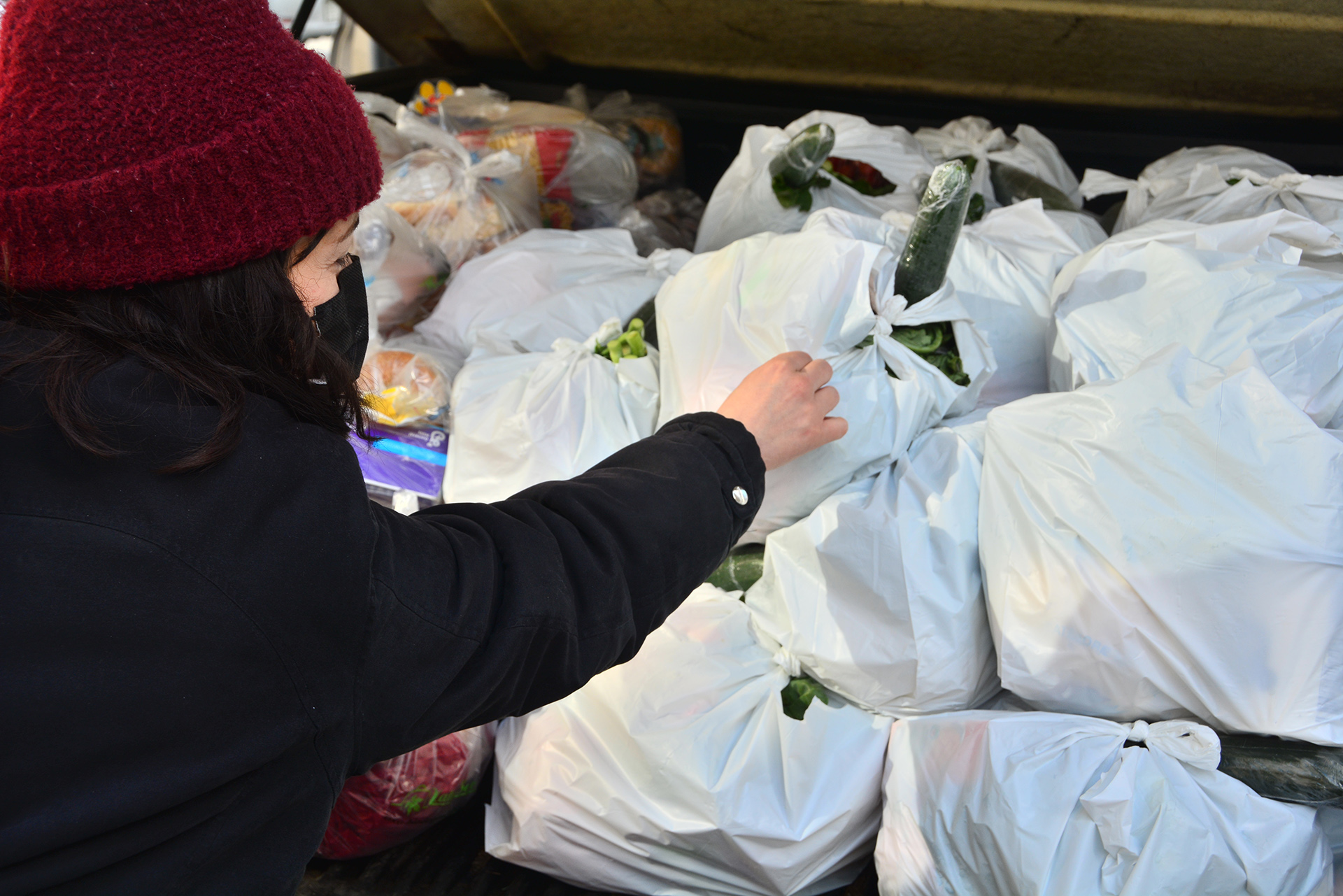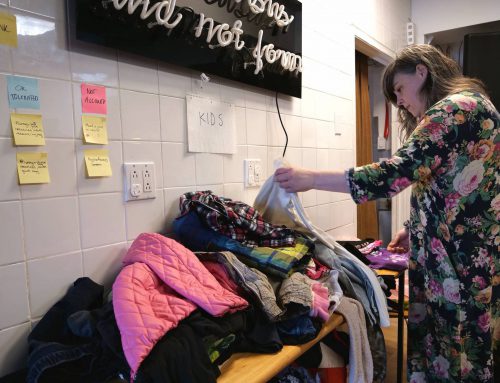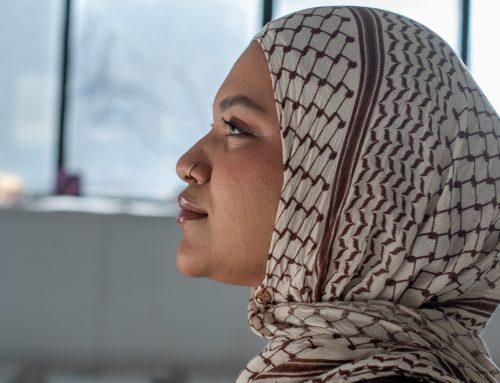BY Lorenza Mezzapelle & David Earles
When COVID-19 hit, Christine Bouchard found herself to be the only remaining member of her team of three outreach workers at Action Centre-Ville, a seniors’ community centre.
Bouchard’s coworkers were burnt-out as a result of an increased workload during the pandemic, and government-imposed restrictions. Consequently, they both took medical leave, leaving Bouchard to complete her team’s tasks alone.
Outreach workers offer resources to vulnerable populations, consisting primarily of Montreal’s elderly and homeless, as well as sex workers and those struggling with addiction.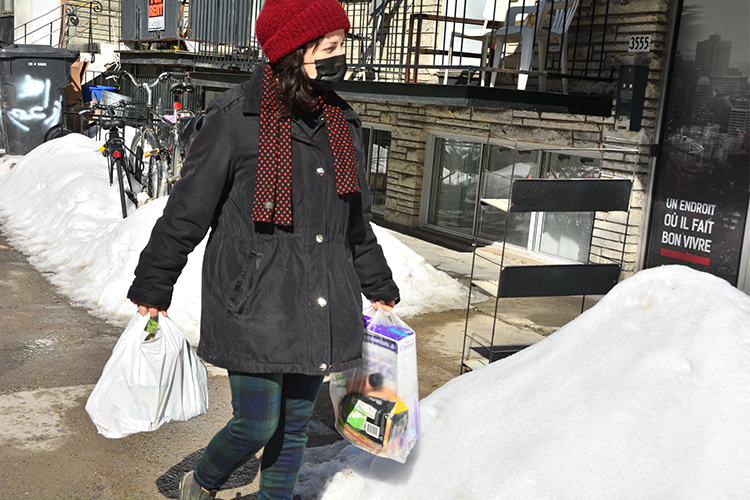
Karen Ounsworth delivers food in Ville-Marie as part of the People’s Potato food basket delivery service. Photo by David Earles.
Workers who help vulnerable communities have been facing health and safety risks as a result of a lack of protective equipment and a shortage of resources.
“Salaries are often very precarious and many positions are contractual,” says Bouchard, adding that one of the primary difficulties stems from the fact that most positions are short-term or volunteer-based, leading to a high staff-turnover.
Bouchard notes that in addition to having to carry out long hours, outreach workers are seldom provided with sick leave, benefits, thorough training, and other basic accommodations that would contribute to the employees’ overall wellbeing.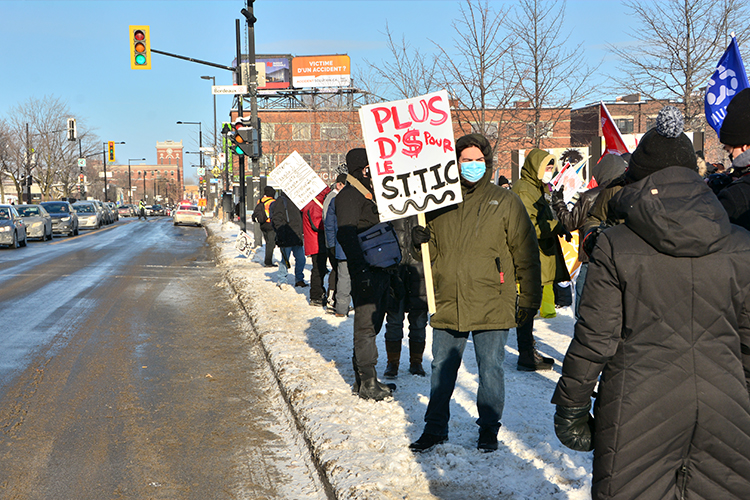
Supporters of the Syndicat Composé des Travailleuses et Travailleurs en Intervention Communautaire (STTIC) demonstrate in Montreal’s east end for better working conditions for outreach workers. Photo by David Earles.
“Our conditions make us exhausted: We are tired, we are fighting against a system that is not there for us, and we are doing this to be able to help people,” says Alexandra Pontbriand, president of the Syndicat des travailleurs et travailleuses en intervention communautaire (STTIC) which represents community outreach workers.
“If we would have the necessary resources to be able to help people we could do a lot better,” she says.
According to a 2020 survey conducted by Imagine Canada, 51 per cent of Canadian charities say their staff was losing the ability to maintain an appropriate work-life balance. Imagine Canada is an organization that works to support charitable and nonprofit organizations.
A lack of resources and volunteers has affected outreach workers’ performance. Video by David Earles.
“When the pandemic started, the focus was really on the fieldwork we do in our community: bringing hot meals to the community, five days a week, fifty-two weeks a year, regardless of what happens,” says Jean-François Veilleux, Communications Coordinator at the Santropol Roulant. “There have been many issues, but we overcame most of the challenges raised by the pandemic.”
At-risk individuals and those aged 70 and over have been asked to stay home which, according to Veilleux, poses a challenge to Santropol’s food delivery service because many of their volunteers are elderly.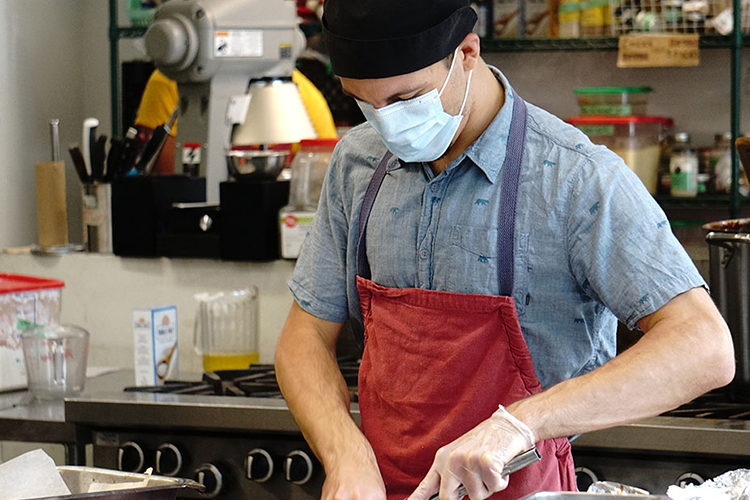
Volunteer chefs prepare meals for Santropol Roulant’s meals-on-wheels program. The initiative faced an increase in demand at the start of COVID-19, when seniors were asked to stay home. Photo courtesy of Jean-François Veilleux.
“[Instead of delivering meals-on-wheels], the elderly volunteers made benevolent calls to clients and volunteers to get news, to chat, and to help change the monotony of confinement a little,” says Veilleux. “We must pay attention to ensure that people are comfortable doing their volunteer work, and we do not want to overwork anyone.”
Despite the challenges posed by public health considerations, Veilleux noted that the Santropol received an influx of almost 500 volunteer applications since the start of the pandemic, which allowed for them to easily adapt.
As a matter of fact, according to Imagine Canada, as of December 2020, 79 per cent of Canadian charitable organizations reported increasing or implementing new practices, as a means of carrying out their mission during COVID-19.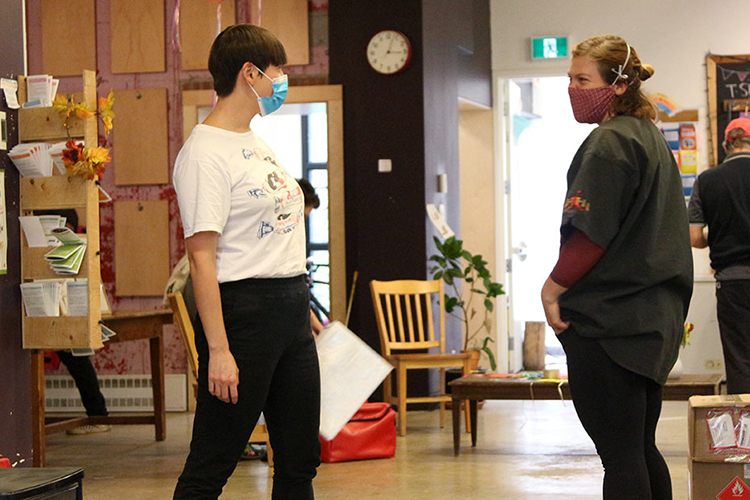
While most outreach organizations have faced challenges due to a decline in volunteers since the start of COVID-19, Santropol Roulant received an influx of close to 500 applications. Photo by Jean-François Veilleux.
However, others have had a more difficult time adapting, like Jamie Cecere, who interned at Face à Face Montreal as a Street Outreach Worker.
Services at Face à Face such as their listening and referral centre, a hotline run by a team of professionally-trained volunteers, have faced an increased demand.
“Many of the duties and work I had to do had to be adjusted to fit the context of the pandemic,” says Cecere. “[A] main duty as an outreach worker is to support those in need of assistance, and because many of the services were not being offered or constantly changing due to government regulations, it was hard to keep up and stay connected, and truly be able to provide necessary support.”
Since the outbreak of the COVID-19 pandemic, a lack of resources and volunteers have contributed to the difficulties faced by outreach workers. By having more hands on deck, the everyday tasks of outreach organizations would be improved. Below are some of the outreach organizations accepting volunteers in Montreal. Media by Lorenza Mezzapelle.
Imagine Canada reported that 74 per cent of nonprofit organizations have recorded a decline in volunteer hours during the pandemic, leaving organizations depleted and struggling to meet the needs of the population.
According to Cecere, many of the organizations that she would normally reach out to and work with were either closed, had reduced hours, or were offering limited services, making it difficult to complete the main part of the job which is to offer services and support to the public.
“We want to help people and provide the best support possible, and that’s really difficult without consistent services and organizations available,” says Cecere.
Regardless of the lack of resources available to them, many outreach workers are committed to providing at-risk communities in Montreal with services and resources, even when it means their own health is on the front-line.
“I’m the only outreach worker who is still there and I count myself lucky, in many ways, to have been able to manage everything without taking a break, but at the same time, I can’t say I’m not exhausted and wouldn’t love support,” says Bouchard. “There are days where it is easier than others, but I keep pushing.”
